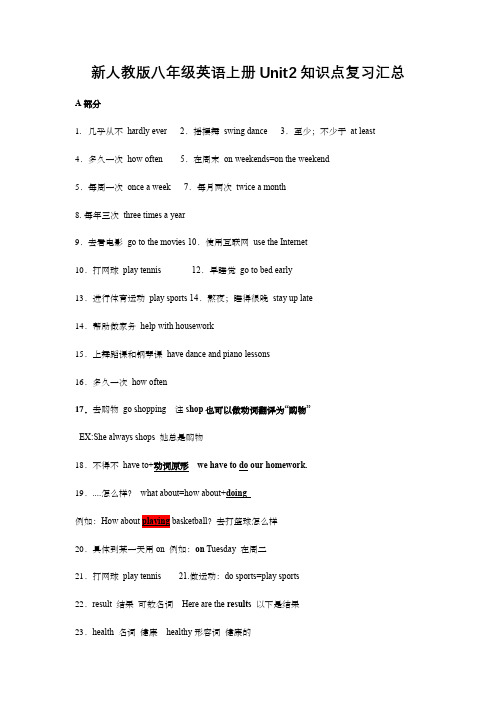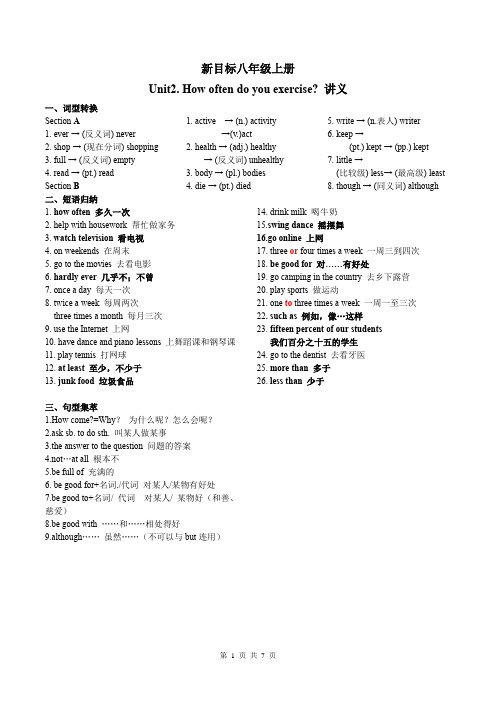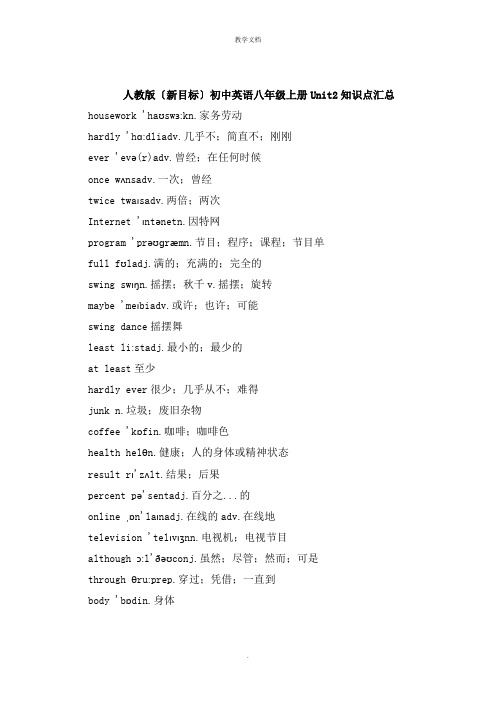人教新目标八年级英语上册Unit2重点知识归纳汇总
人教版八年级上册英语unit2重难点知识点梳理扩展

人教版八年级上册unit2知识点梳理及拓展CONTENT本讲课程内容:八上《新目标》Unit 2 How often do you exercise?Part 1 vocabulary 高频单词短语Part 2 grammar 语法要点Part 3 exercise 真题训练Unit 2 How often do you exercise?Part 1 vocabulary高频单词短语1. Next week is quite full for me.●---Do you need some more cakes? ---No, thanks, I am full. 吃饱的●I really had a full week so I don’t want to go out today.忙碌的●He has been studying in the new school for a full year. 完整的,整个的●The glass is full of water.装满的词组积累:●full marks满分●live a full life过着充实的生活●be full of 充满2. She says it’s good for my health.●keep / be in good health 健康状况好●keep / be in bad / poor health 健康状况不好●keep healthy/ fit 保持健康● a healthy lifestyle健康的生活方式3. Here are the results.●His illness is the result of a car accident …的结果(后加原因)●He made one big mistake, and as a result, lost his job. 作为结果4. We think the best way to relax is through exercise.●prep.We got the news through him. 通过;以,凭借I tried to call you but I couldn't get through. (电话)接通He will not live through the night. 在整个期间,自始至终I didn’t get through the exams. 通过●adj.Are you through with the computer yet ? 完成(某事);用完(某物)I’m through with you ! 与(某人)关系完结5. and you can spend time with your friends and family as you play together.●conj.She doesn’t sing as well as her sister. 和…一样When in Rome,do as Romans do. 按照…的方式;如同As my mother isn’t at home,we have to eat out. 由于;因为As time goes on, we'll grow up. 随着;当…的时候众所周知as everyone knows / as far as we know●prep.Dad dressed up as Santa Claus. 作为5. Old habits die hard.●1)死;死亡The man died young, at the age of 27.死于die of hunger/cancer/illnessdie from an earthquake/ an accident●2)消亡;消失Our love will never die. 我们的爱始终不渝。
新人教版八年级英语上册Unit2知识点复习汇总

新人教版八年级英语上册Unit2知识点复习汇总A部分1.几乎从不hardly ever 2.摇摆舞swing dance 3.至少;不少于at least4.多久一次how often 5.在周末on weekends=on the weekend5.每周一次once a week 7.每月两次twice a month8.每年三次three times a year9.去看电影go to the movies 10.使用互联网use the Internet10.打网球play tennis 12.早睡觉go to bed early13.进行体育运动play sports 14.熬夜;睡得很晚stay up late14.帮助做家务help with housework15.上舞蹈课和钢琴课have dance and piano lesson s16.多久一次how often17.去购物go shopping 注shop也可以做动词翻译为“购物”EX:She always shops 她总是购物18.不得不have to+动词原形we have to do our homework.19.....怎么样?what about=how about+doing例如:?去打篮球怎么样20.具体到某一天用on 例如:on Tuesday 在周二21.打网球play tennis 21.做运动:do sports=play sports22.result 结果可数名词Here are the results以下是结果23.health 名词健康healthy形容词健康的24.What kind of ....种类?25.free空闲的,自由的,免费的free的反义词是full例子:free time空闲时间free time activities自由活动full满的,忙的,充满的be full of 充\装满了.. 例:The bottle is full of water这个瓶子装满了水。
Unit2单元总结人教版八年级英语上册

八年级上册Unit 2 单元总结一、重点短语1. help with housework 帮着做家务2. use the Internet 使用互联网3. go to the movies 去看电影4. my favorite TV program ( s)我最喜欢的电视节目5. how often 多久一次6. have dance and piano lessons 上舞蹈与钢琴课7. swing dance 摇摆舞swung ( swing 的过去式)8. hardly ever 几乎从不9. play tennis with friends 与朋友打网球10. stay up late 熬夜11. eat a healthy breakfast 吃一顿健康的早餐12. play sports 进行体育运动13. at least / at most twice a week 一周至少/最多两次14. be good for my health 有利于我的健康healthy ( health 的形容词形式)15. eat junk food 吃垃圾食品16. drink coffee 喝咖啡drank ( drink 的过去式)17. No.5 High School students 第5中学学生18. in one’s free time 在某人的空余时间19. ask them about their free time activities 询问他们关于他们的业余活动20. not … at all 根本不…21. go online 上网22. be surprised that ..感到惊讶23. use it for fun 为了取乐而使用它24. the answers to the questions 这些问题的答案25. one to three times a week 一周一到三次26. two percent of the students 2%的学生28. such as 例如29. spend time with your friends 与你的朋友共度时光spent ( spend 的过去式)30. spend time on sth./ in doing sth.花时间在某事上/做某事31. play together 一起玩32. watch TV for over 2 hours 看两个多小时电视33. go to the dentist 去看牙医34. a 16yearold high school student 一名16岁的中学生35. have a lot of good habits 有许多好习惯36. more / less than two hours 多/少于两小时37. go to the dentist for teeth cleaning 去牙医处清洁牙齿38. go to the shopping center 去购物中心二、重点句子语法聚焦1. What do you usually do on weekends?你在周末通常做什么?I always exercise.我总是锻炼。
人教版新课标八年级上册英语Unit2知识点归纳

人教版新课标八年级上册英语Unit2知识点归纳人教版新课标八年级上册英语Unit 2知识点归纳Unit 2 hat’s the atter?【复习目标】●掌握身体各部位名称的英表达方式●能表述身体的种种不适以及对他人身体的种种不适给予适当的建议【语言目标】● hat’s the atter? I have a headahe.● yu shuld drink se tea. The sunds like a gd idea.● I have a sre bak. That’s t bad .● I hpe yu feel better sn.【重点词汇】● head, nse, eye, ear, tth, nek, stah, bak, leg, ar, ft, thrat● thirsty, stressed ut,/ dentist, lie, rest, hney, water, illness, advie.● ld, fever, headahe, tthahe, stahahe, sre thrat【应掌握的词组】1. Have a ld 感冒2. sre bak 背痛3. nek and nek 并驾齐驱,齐头并进4. I have a stahahe 我胃痛= I have gt a stahahe = There is sething wrng with y stah= y stah hurts = I have (gt) a pain in y stah5. hat’s the atter? 怎么了?= hat’s the truble (with yu)? = hat’s yur truble?= hat’s wrng (with yu)?= hat’ the atter (with yu)? =hat has happened t yu?= Is there anything wrng (with yu)? = what’s up?6. sre thrat 咽喉痛7. lie dwn and rest 躺下休息8. see a dentist 看牙医9. drink lts f water 多喝水10. ht tea with hney 加蜂蜜的热茶11.That’s a gd idea 好主意12.That’s t bad 太糟糕了13.I think s 我认为如此14. I’ nt feeling well. 我觉得不太舒服= I’ nt feeling fine/all right. = I’ feelingill/sik. =I feel terrible/bad.= I dn’t feel well.15. get se rest 多休息16. I have n idea = I dn’t knw 我不知道17. stressed ut 筋疲力尽18. I a tired 我累了 He is tired. 他累了19. a healthy lifestyle健康的生活方式20. traditinal hinese dtrs传统中医21. a balane f yin and yang阴阳调和22. yu have t uh yin.你阴气太盛23. t eat a balane diet饮食平衡24. healthy fd 健康食品25. stay healthy 保持健康=keep healthy=keep in gd health = keep fit26. eny neself (yself, yurself, herself, hiself, theselves, urselves, itself反身代词) 玩得高兴,过得愉快=have a gd tie = have a wnderful tie = have fun27. eny sth. =like sth. (名词)喜欢某物,eny ding sth.喜欢做某事=like ding sth pratie ding sth.练习做某事,ind ding sth. 介意做某事, finish ding sth.完成某事,give up ding sth.放弃做某事, an’t help ding sth.忍不住做某事,keep ding sth. 坚持做某事. (keep n ding sth. / keep sb. ding sth. )be busy ding sth. 忙着做某事 be used t ding sth.习惯于做某事ake a ntributin t ding sth.为..做贡献g n ding sth. 继续做某事 frget ding sth.忘记做过某事reeber ding sth. 记得做过某事 spend....(in) ding sth. 花(时间)做某事prefer ding sth.t ding sth.比起(做...)更愿意(做...)28. at the ent = nw 此刻29. Hst faily 东道家庭30. nversatin pratie会话练习31. I’ srry t hear that.听到此事我很难过【应掌握的句子】1. hat’s the atter? I have a bad ld. 你怎么了?我得了重感冒。
人教版新目标八年级英语上册Unit 2讲义及重点总结

新目标八年级上册Unit2. How often do you exercise? 讲义一、词型转换Section A1. ever → (反义词) never2. shop → (现在分词) shopping3. full → (反义词) empty4. read → (pt.) readSection B 1. active → (n.) activity→(v.)act2. health → (adj.) healthy→ (反义词) unhealthy3. body → (pl.) bodies4. die → (pt.) died5. write → (n.表人) writer6. keep →(pt.) kept → (pp.) kept7. little →(比较级) less→ (最高级) least8. though → (同义词) although二、短语归纳1. how often 多久一次2. help with housework 帮忙做家务3. watch television 看电视4. on weekends 在周末5. go to the movies 去看电影6. hardly ever 几乎不;不曾7. once a day 每天一次8. twice a week 每周两次three times a month 每月三次9. use the Internet 上网10. have dance and piano lessons 上舞蹈课和钢琴课11. play tennis 打网球12. at least 至少,不少于13. junk food 垃圾食品14. drink milk 喝牛奶15.swing dance 摇摆舞16.go online 上网17. three or four times a week 一周三到四次18. be good for 对……有好处19. go camping in the country 去乡下露营20. play sports 做运动21. one to three times a week 一周一至三次22. such as 例如,像…这样23. fifteen percent of our students我们百分之十五的学生24. go to the dentist 去看牙医25. more than 多于26. less than 少于三、句型集萃1.How come?=Why?为什么呢?怎么会呢?2.ask sb. to do sth. 叫某人做某事3.the answer to the question 问题的答案4.not…at all 根本不5.be full of 充满的6. be good for+名词./代词对某人/某物有好处7.be good to+名词/ 代词对某人/ 某物好(和善、慈爱)8.be good with ……和……相处得好9.although……虽然……(不可以与but连用)四、难点讲练1.How often do you exercise?你多久锻炼一次?(1)how often表示“多久一次”。
人教版新目标初中英语八年级上册Unit2知识点汇总

人教版〔新目标〕初中英语八年级上册Unit2知识点汇总housework 'haʊswɜːkn.家务劳动hardly 'hɑːdliadv.几乎不;简直不;刚刚ever 'evə(r)adv.曾经;在任何时候once wʌnsadv.一次;曾经twice twaɪsadv.两倍;两次Internet 'ɪntənetn.因特网program 'prəʊɡræmn.节目;程序;课程;节目单full fʊladj.满的;充满的;完全的swing swɪŋn.摇摆;秋千v.摇摆;旋转maybe 'meɪbiadv.或许;也许;可能swing dance摇摆舞least liːstadj.最小的;最少的at least至少hardly ever很少;几乎从不;难得junk n.垃圾;废旧杂物coffee 'kɒfin.咖啡;咖啡色health helθn.健康;人的身体或精神状态result rɪ'zʌlt.结果;后果percent pə'sentadj.百分之...的online ˌɒn'laɪnadj.在线的adv.在线地television 'telɪvɪʒnn.电视机;电视节目although ɔːl'ðəʊconj.虽然;尽管;然而;可是through θruːprep.穿过;凭借;一直到body 'bɒdin.身体mind maɪnd.头脑;想法;意见;心思such sʌtʃadj.这样的;如此的together tə'ɡeðə(r)adv.共同;一起die daɪv.死;枯竭;消逝writer 'raɪtə(r)n.dentist 'dentɪstn.牙科医生magazine 'mæɡəziːnn.杂志however haʊ'evə(r)adv.然而;无论如何;不管多么than ðənconj.比almost 'ɔːlməʊstadv.几乎;差不多none nʌnpron.没有人;没有任何东西,毫无less lesadj.更少的;较少的point pɔɪntn.看法;要点;重点;小数点;目标;分数such as例如;诸如junk food n.垃圾食品;无营养食品more than超过;多于;不仅仅;非常less than不到;少于Claire克莱尔Sue 苏American Teenager (美国青年少)02Unit2知识梳理(重点短语)1.Clean-Up Day 清洁日2. an old people’s home 养老院3. help out with sth. 援助解决困难4. used to 过去常常......5. care for 关怀;照顾6. the look of joy 愉快的表情7. at the age of 在......岁时8.clean up 清扫(或去除)干净9. cheer up (使)变得更愉快;振奋10. give out 分发;散发11. come up with 想出;提出12. make a plan 制订方案13. make some notices 做些公告牌14. try out 试用;试行15. work for 为…工作;为…. 效力16. put up 建筑;举起;张贴17. hand out 分发;散发;发给18. call up 打 ;召集19. put off 推迟;延迟20. for example 比方;例如21. raise money 筹钱;募捐22. take after 与......相像;像23. give away 赠送;捐赠24. fix up 修理;修补;解决25. be similar to 与……相似26. set up 建立;设立27. disabled people 残疾人28. make a difference 影响;有作用29. be able to 能够30. after-school reading program 课外阅读工程(重点句型)1. The boy could give out food at the food bank.这个男孩可以在食品救济站分发食物。
英语八年级上册重点单词(Unit 2 How often do you exercise)-知识讲义-人教新目标
知识梳理:一、单词领读二、重点单词【单词学习】1. twice adv.两次;两倍【用法】当提问twice时,用疑问词how many times(多少次),但不能用how often提问。
【例句】We have Chinese twice a day on Friday. 周五我们一天上两节语文课。
【拓展】once表示“一次”;twice表示“两次”,从“三次”起用“基数词+times”表示次数。
如:three times 三次;five times 五次。
【考题链接】We visit the home for the elderly _______________(两次)a month.答案:twice2. full adj.忙的;满的;充满的【用法】常用短语为be full of …,意为“充满……”;反义词是empty,意为“空的”。
【例句】The bus is full of people. 公共汽车里挤满了人。
【拓展】full adj.吃饱的;过饱的,其反义词是hungry,意为“饥饿的”。
【例句】Are you hungry or full? 你是饿还是饱了?【考题链接】There is a glass on the table. It’s full ____________________ water.A. withB. inC. ofD. at答案:C思路分析:本题考查full的用法。
be full of意为“充满……”,故用介词of。
句意为“桌子上有一个玻璃杯。
它装满了水”。
3. maybe adv.或许;大概;可能【用法】常位于句首表推测。
【例句】Maybe that man is a policeman. 或许那人是警察。
【辨析】maybe 和may bemaybe 副词,意为“或许;大概”,常位于句首表推测。
Maybe your baseball is under yourdesk.或许你的棒球在你的课桌下面。
(重要)新目标八年级上册英语第二单元
八年级上册英语第二单元知识点归纳Unit 2 How often do you exercise?一.词组,短语:1、help with housework2、go shopping3、on weekends4、how often5、hardly ever6、once a week7、twice a month 8、go to the movies9、every day 10、use the Internet11、be free 12、have dance and piano lessons13、swing dance 14、play tennis15、stay up late 16、at least17、go to bed early 18、play sports19、be good for 20、go camping21、in one’s free time 22、not….at all23、the most popular 24、such as25、go to the dentist 26、more than27、Old habits die hard 28、hard=difficult29、less than二.习惯用法,固定搭配:1. help sb. with sth2. How about+n./v.ing?=What about…?3. want sb. to do sth.4. How many +5. 主语+ find+ that6. It’s + adj.+ to do sth.7. spend time with sb.8. ask sb. about sth.9. by doing sth.10. What’s your favorite…..?11 start doing sth.12. the best way to do sth.13、leave for…三.知识精讲:1.How often do you exercise?你多久锻炼一次?【解析】本句是含有特别疑问词how often 的特别疑问句。
人教版新目标八年级英语上册Unit2-What’s-the-matter知识点总结
Unit2 What’s the matter?考点:1.Sentences:1. What’s the matter? I have a cold.2. I have a headache/stomachache/toothache/sore back/sore throat.3. You should go to bed/drink some water.4. Traditional Chinese doctors believe we need a balance of yin and yang to be healthy.5. Eating Dangshen and Huangqi herbs is also good for this.6. It’s easy to have a healthy lifestyle, and it’s important to eat a balanced diet.2.情感目标: Help the student learn how to talk about health problems and giveadvice on that with the language points.3、教学重、难点:Talk about your health and give advice.知识点:I. 应掌握的词组:1. Have a cold 感冒2. sore back 背痛3. neck and neck 并驾齐驱,齐头并进4. I have a stomachache 我胃痛= I have got a stomachache=There is something wrong with my stomach=My stomach hurts = I have (got) a pain in my stomach5. What’s the matter? 怎么了?= What’s the trouble (with you)? = What’s your trouble?= What’s wrong (with you)? =What’ the matter (with you)?=What has happened to you? =Is there anything wrong (with you)?= what’s up?6. sore throat 咽喉痛7. lie down and rest 躺下休息8. see a dentist 看牙医9. drink lots of water 多喝水10. hot tea with honey 加蜂蜜的热茶11.That’s a good idea 好主意12.That’s too bad 太糟糕了13.I think so 我认为如此14.I’m not feeling well. 我觉得不太舒服= I’m not feeling fine/all right.=I’m feeling ill/sick.=I feel terrible/bad.= I don’t feel well.15. get some rest 多休息16. I have no idea = I don’t know我不知道17. stressed out 筋疲力尽18. I am tired 我累了He is tired. 他累了19. a healthy lifestyle健康的生活方式20. traditional Chinese doctors传统中医21. a balance of yin and yang阴阳调和22. you have too much yin.你阴气太盛23. to eat a balance diet饮食平衡24.healthy food 健康食品25. stay healthy 保持健康=keep healthy=keep in good health = keep fit26.enjoy oneself (myself, yourself, herself, himself, themselves, ourselves, itself反身代词) 玩得高兴,过得愉快=have a good time = have a wonderful time=have fun27. enjoy sth.=like sth.(名词)喜欢某物,enjoy doing sth.喜欢做某事=like do i ng sthPractice doing sth.练习做某事,mind doing sth. 介意做某事,finish doing sth.完成某事,give up doing sth.放弃做某事,can’t help doing sth.忍不住做某事,keep ding sth. 坚持做某事.即:practice, mind, finish, give up, can’t help, keep 与enjoy用法基本相似28.at the moment = now 此刻29. Host family 东道家庭30. Conversation practice会话练习31.I’m sorry to hear that.听到此事我很难过II. 应掌握的知识点和句子:1.—What’s the matter? 怎么了?—I have a cold. 我患感冒了。
人教新目标英语八年级上册Unit2单元知识点精细整理
人教新目标英语八年级上册Unit 2 How often do you exercise?单元知识点精细整理1.help with housework 帮忙做家务2.hardly (ever) 几乎不3.on/at weekends 在周末on weekdays 在平时/在工作日4.once a week 一周一次twice a month 一个月两次three times a day 一天三次5.how often 多久一次how come? 怎么会?e the Internet 使用互联网use of the Internet 互联网的使用7.stay up late 熬夜8.go to bed early 早睡9.at least 至少/起码10.play/have/do sports = take exercise 锻炼新| 课|标| 第|一| 网11.eat a healthy breakfast 吃健康的早餐12.(much) too busy 太忙了13.be good for 对….有益14.have/take dance and piano lessons 上舞蹈课和钢琴课15.in one’s free/spare time 在。
的业余时间16.free time activities 课余活动17.three or four times 三四次18.one to three times 一至三次19.more than = over 多于20.less than 少于21.such as (for example) 例如22.go to the dentist = see the dentist 看牙医23.ask sb about sth 向。
询问。
24.a few times 几次25.not … at all 一点也不26.spend time with sb 与。
一起度过时光27.a 16-year-old high school student 一个16岁的高中学生28.Old habits die hard. 旧习难改。
- 1、下载文档前请自行甄别文档内容的完整性,平台不提供额外的编辑、内容补充、找答案等附加服务。
- 2、"仅部分预览"的文档,不可在线预览部分如存在完整性等问题,可反馈申请退款(可完整预览的文档不适用该条件!)。
- 3、如文档侵犯您的权益,请联系客服反馈,我们会尽快为您处理(人工客服工作时间:9:00-18:30)。
人教新目标八年级英语上册重点知识归纳汇总Unit2 How often do you exercise?
一·重点单词用法
1. housework 家务[U]
do housework 做家务
做家庭作业:do homework
2. hardly 几乎不adv. 表频率
hard adv. 努力地study hard 努力学习
adj. 困难的,坚硬的It's hard to do sth.做某事很困难
3. once/ twice/ three times 一次/两次/三次
对频率提问用“ how often”
4. Internet 互联网
on the Internet 在网上
surf the Internet 网上冲浪
5. full n. 忙的,满的,饱的
eg. Next week is full for me. 下周我很忙。
I'm full now. 我现在饱了。
The cup if full of water. 瓶子里装满了水。
be full of 充满......
6. maybe adv. 大概,或许,可能
Maybe you are right.
may be 情态动词+be结构可能是
You may be right.
7. least adv. 最少,最小(最高级)
比较级:less 原级:little
at least 至少,不少于
8. health n. 健康
healthy adj. 健康的
healthily adv. 健康地
keep/stay/be healthy= keep in good health
eg. We eat healthy food. 我们吃健康的食物。
We eat healthily.我们吃地健康。
It's good for our health. 它对我们的健康有好处。
10. percent 百分之...
90%:ninety percent
11. online 在线的
go online 上网
buy sth. online 网上买某物
although 虽然,尽管=though
(引导让步状语从句),不能与but连用
eg. Although my grandpa is old, he looks healthy.
尽管我的爷爷老了,但是他看起来很健康。
13. through 以,穿过,凭借
through 从空间内部穿过
12.have dance and piano lessons 上舞蹈课和钢琴课
13.swing dance 摇摆舞14.play tennis 打网球15.stay up late 熬夜16.at least 至少
17.go to bed early 早点睡觉18.play sports 进行体育运动19.be good for 对...有好处20.go camping 去野营
21.in one’s free time 在某人的业余时间
22.not... At all 一点也不
23.the most popular 最受欢迎的
24.such as 例如,好像25.go to the dentist 去看牙医26.more than 多于27less than 少于
28.how about...?=what about...? ...怎么样?
29.spend time with sb. 和某人一起度过时光
30.ask sb about sth 向某人询问某事
31.by doing sth. 通过做某事
32.the best way to do sth. 做某事的最好方式
四.重点句型
What do you usually do on weekends?
I always exercise.
What do they do on weekends?
They often help with housework.
What does she do on weekends?
She sometimes goes shopping.
How often do you go to the movies?
I go to the movies maybe once a month.
How often does he watch TV?
He hardly ever watches TV.
Do you go shopping?
No, I never go shopping.
How many hours do you usually sleep at night?
Eight or more.
五.单元语法:频度副词
频度副词含义:
(1)表示次数,频率的副词成为频度副词。
Always(总是)>usually(通常)>often(经常)>sometimes(有时)>seldom(很少)>hardly ever(几乎不)>never(从不)
表示具体的频率,次数时,一次用once, 两次用twice,三次以上用“基数词+times”.
Eg. He always comes late. 他总是迟到。
I play soccer twice a week. 我一周踢两次足球。
频度副词在句中的位置:一般用在实义动词之前,be动词,助动词或情态动词之后,有时为了强调,也可置于句首。
Eg. We never eat junk food. 我们从不吃垃圾食品。
Lucy is sometimes very busy. 露西有时很忙。
Sometimes Jack plays computer games.
有时杰克玩电脑游戏。
* always一般不用于句首,但可用于祈使句中。
Always remember this. 请时刻记住这一点。
对频度副词提问时,用how often.
- How often do you exercise?
- Hardly ever.。
